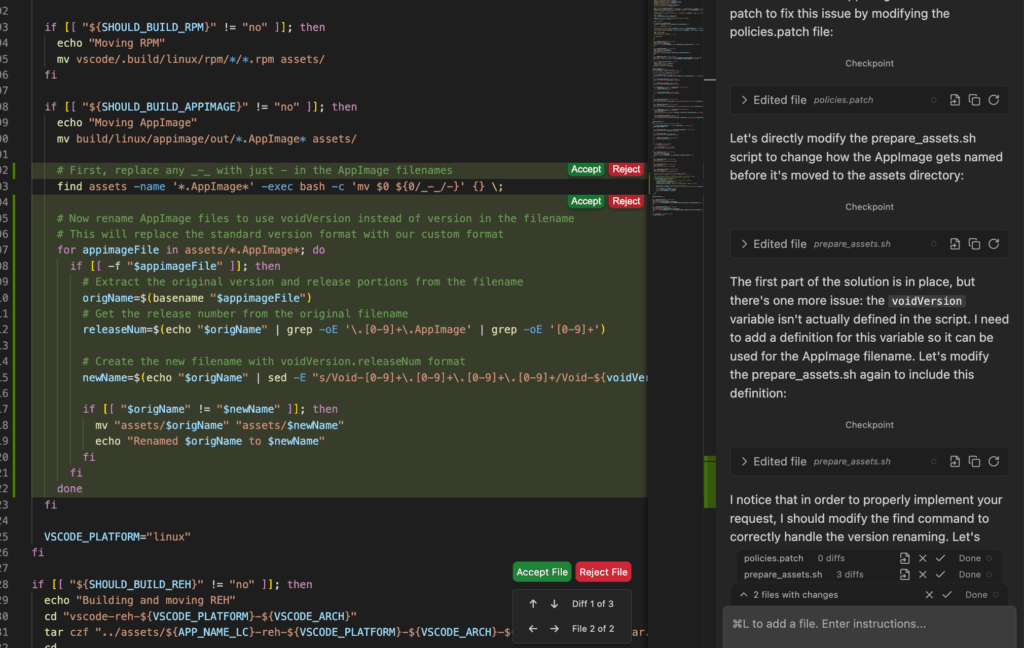The rise of artificial intelligence in software development has transformed programming environments. Editors like Cursor and Windsurf have gained traction thanks to their native integration with language models, but at the cost of heavy reliance on closed systems and private backends. In this context, Void emerges as an open-source alternative that aims to deliver the same — and more — while giving developers full control and transparency.
What is Void?
Void is a fork of Visual Studio Code, which means it inherits the full ecosystem: extensions, settings, themes, and keybindings. But it adds a key differentiator: an open, modular AI layer that lets users work with both commercial models (GPT, Claude, Gemini, Grok) and self-hosted models (Llama, Qwen, DeepSeek, Gemma).
The result is an environment where developers decide: use cloud-based models when convenient, or run local ones to protect privacy and cut costs.
Key Features
- Tab Autocomplete: predictions applied instantly, similar to Copilot or Cursor.
- Quick Edit: inline edits on selected code snippets.
- Chat with specialized modes:
- Agent Mode: can create, edit, or delete files, run the terminal, and use MCP.
- Gather Mode: read-only, ideal for safe code analysis.
- Standard Chat: regular conversational support.
- Checkpoints: versioning to visualize and compare AI-generated changes.
- Support for large files: fast edits even on 1,000+ line files.
- Built-in lint error detection.
Comparison with the most popular editors
| Feature | Void (open source) | Cursor (proprietary) | Windsurf (proprietary) | VS Code with Copilot (proprietary) |
|---|---|---|---|---|
| Business model | Free, open-source, no backend | Monthly subscription | Monthly subscription | GitHub Copilot subscription |
| Compatibility | Full VS Code extensions & settings | Based on VS Code but closed | Based on VS Code but closed | Full VS Code integration |
| Model support | Local (Llama, DeepSeek, Qwen…) + cloud | Primarily OpenAI (GPT) | OpenAI + some external providers | OpenAI (GPT-4, GPT-4o, etc.) |
| Privacy | Full: no data sent to private servers | Data routed through proprietary backend | Data routed through proprietary backend | Data handled by GitHub/OpenAI |
| AI features | Chat, autocomplete, agents, MCP | Autocomplete, chat, refactoring | Autocomplete, chat, limited agents | Autocomplete, chat, suggestions |
| Cost control | Full: local or chosen API use | Limited to Cursor’s options | Limited to Windsurf’s pricing | Fixed Copilot subscription |
| Community | Open, active on Discord & GitHub | Closed, company-managed | Closed, company-managed | Broad but user influence is minimal |
The key difference lies in developer control: Cursor, Windsurf, and GitHub Copilot funnel everything through their infrastructure, while Void leaves it up to users to choose the model, the connection method, and where data is processed.
Privacy and self-sufficiency: the big advantage
For companies dealing with sensitive code or compliance requirements, Void has a clear edge. By enabling connections to local models via Ollama or vLLM, it prevents code from being transmitted to third-party servers.
Additionally, by not relying on API credit systems, teams can reduce operational costs and maximize their own hardware (GPUs or local servers).
Community and open development
Void is hosted on GitHub (voideditor/void) under the Apache 2.0 license, with over 2,700 commits. The project actively encourages participation through:
- Weekly contributor meetings on Discord.
- Open documentation for newcomers.
- Guides like the VOID_CODEBASE_GUIDE to understand the editor’s core.
Although development on the main IDE is temporarily paused while the team experiments with new AI ideas, beta releases are available now at voideditor.com.
Conclusion
The battle of AI-powered code editors is no longer just about features, but also about philosophy and control. While Cursor and Windsurf push for closed ecosystems and Copilot is deeply tied to GitHub/OpenAI, Void stands out as the open, flexible, and privacy-focused choice.
As developers demand more technological independence, Void could become the go-to editor for those who want an AI-powered IDE without strings attached.
Frequently Asked Questions (FAQ)
1. How is Void different from Cursor or Windsurf?
Void doesn’t rely on private backends: it connects directly to local or cloud models, giving users control over privacy and costs.
2. Can I use Void just like VS Code?
Yes. As a fork of VS Code, it supports importing themes, extensions, and settings seamlessly.
3. What AI models can I use with Void?
Both open-source models like Llama, Qwen, DeepSeek, Gemma and commercial ones like GPT, Claude, Gemini, and Grok.
4. Is Void free?
Yes. It’s licensed under Apache 2.0, with source code available on GitHub. Costs only apply if you use paid APIs; local models run without additional charges.

